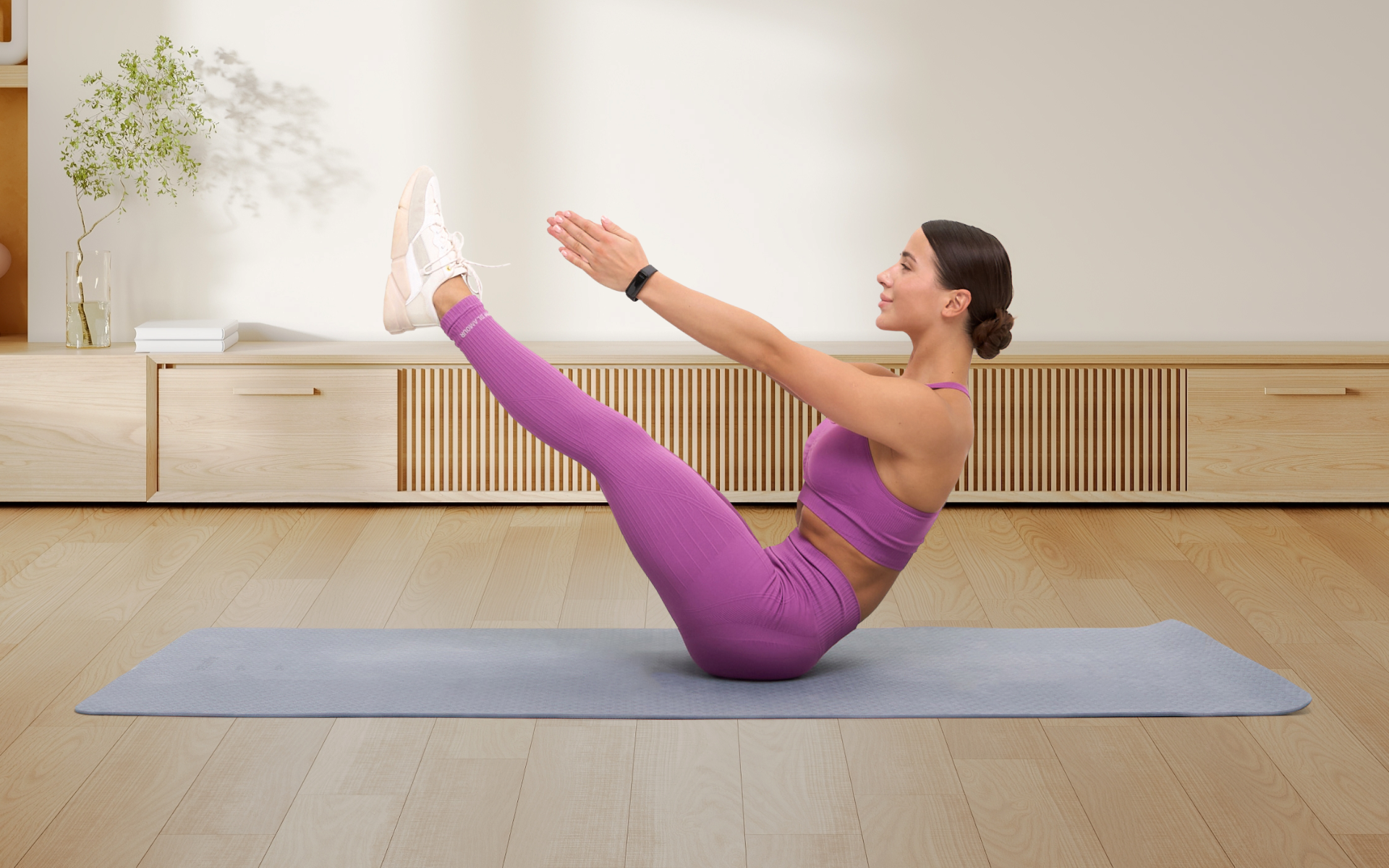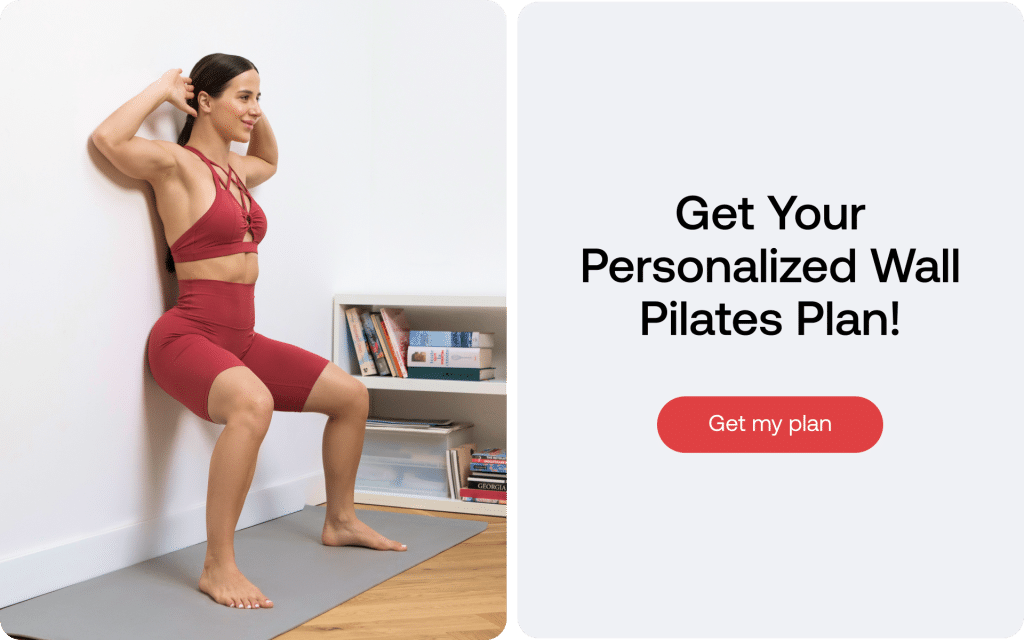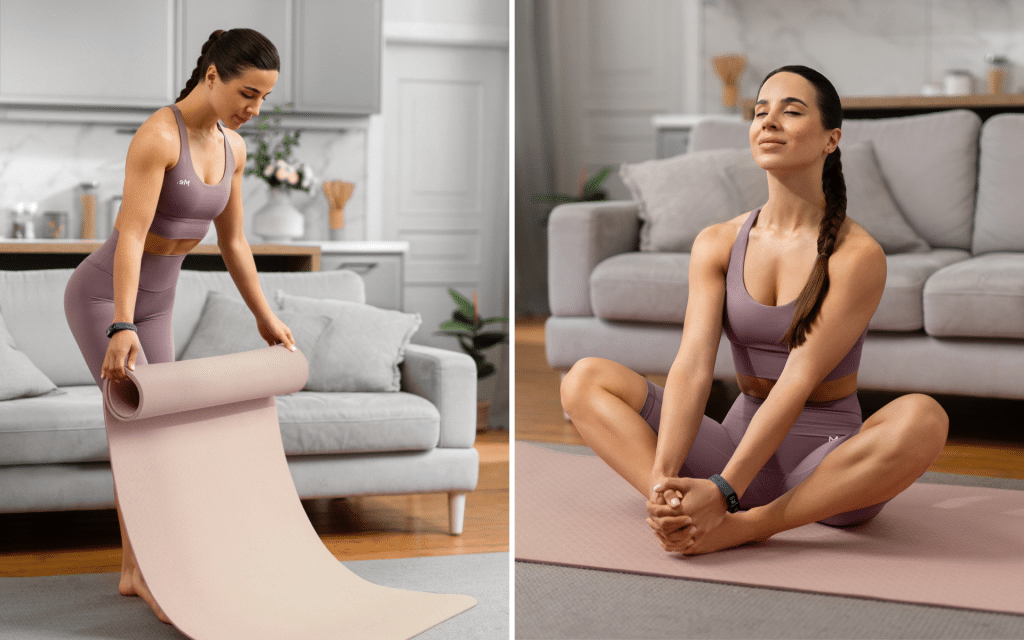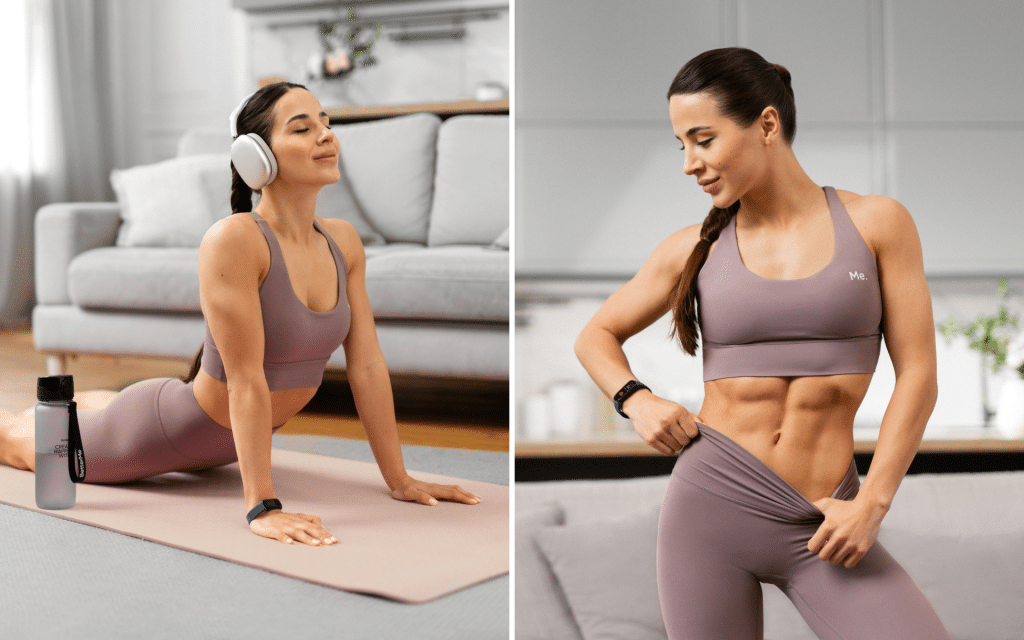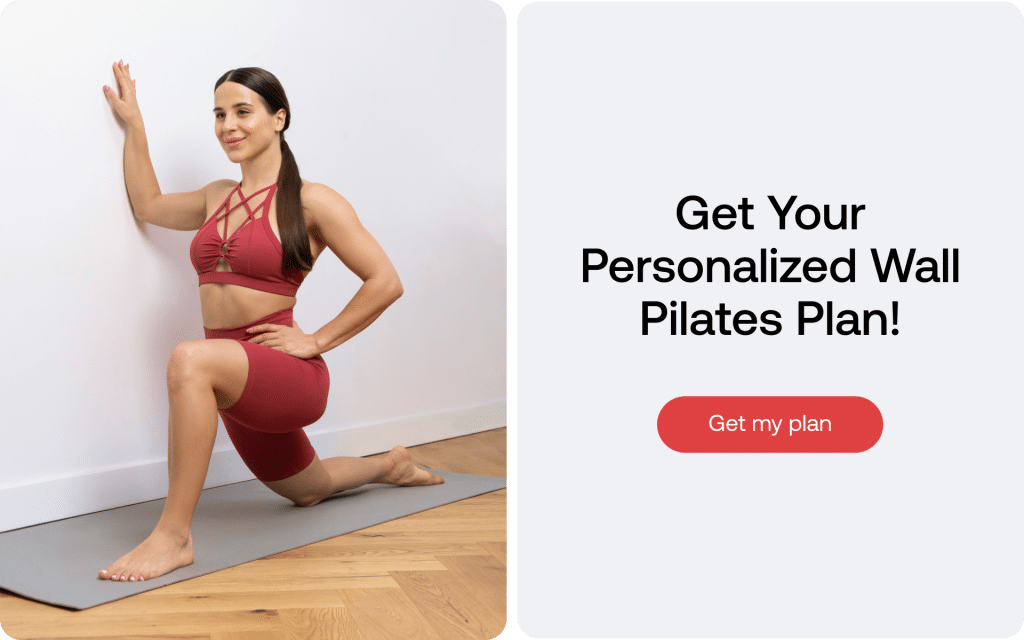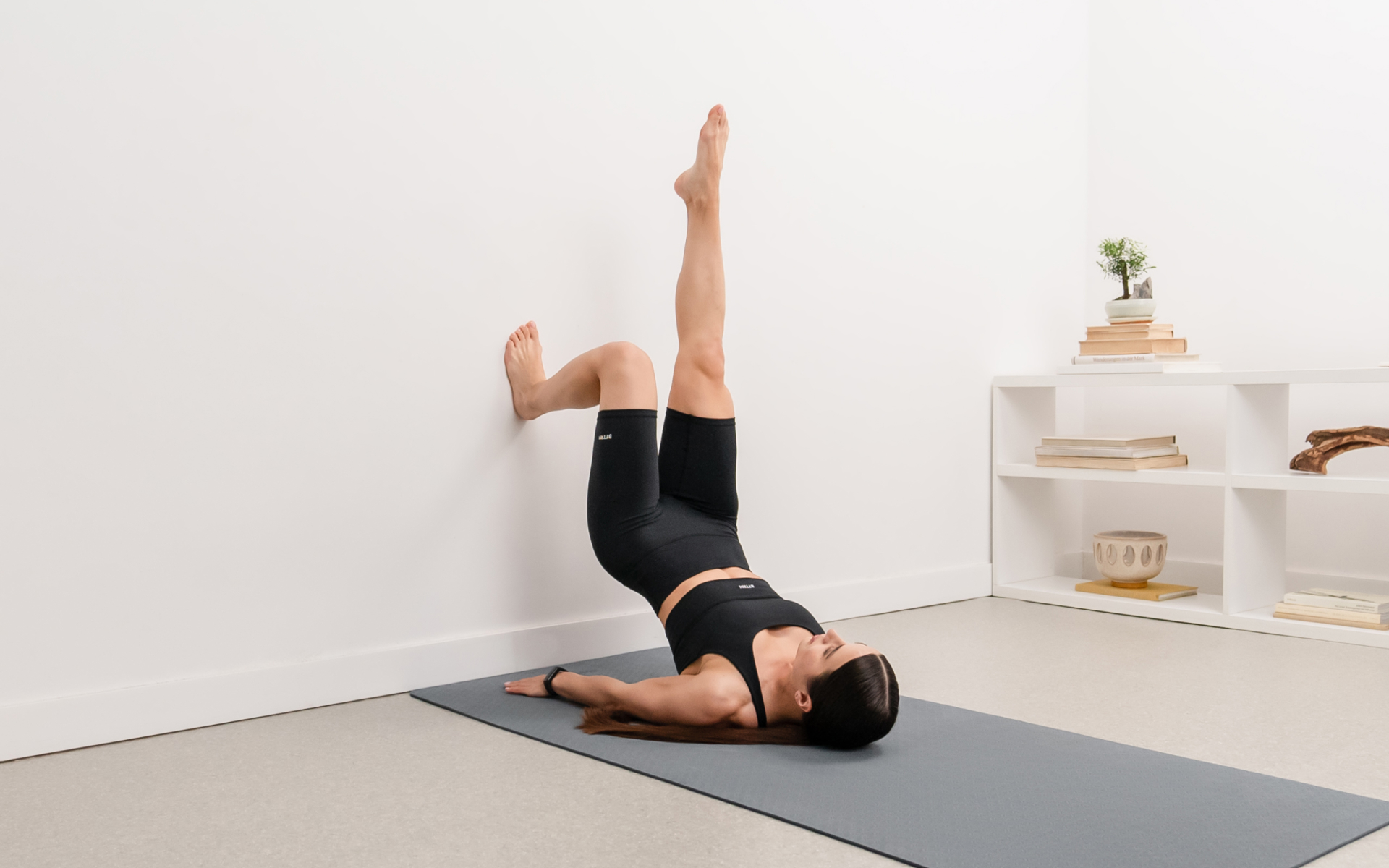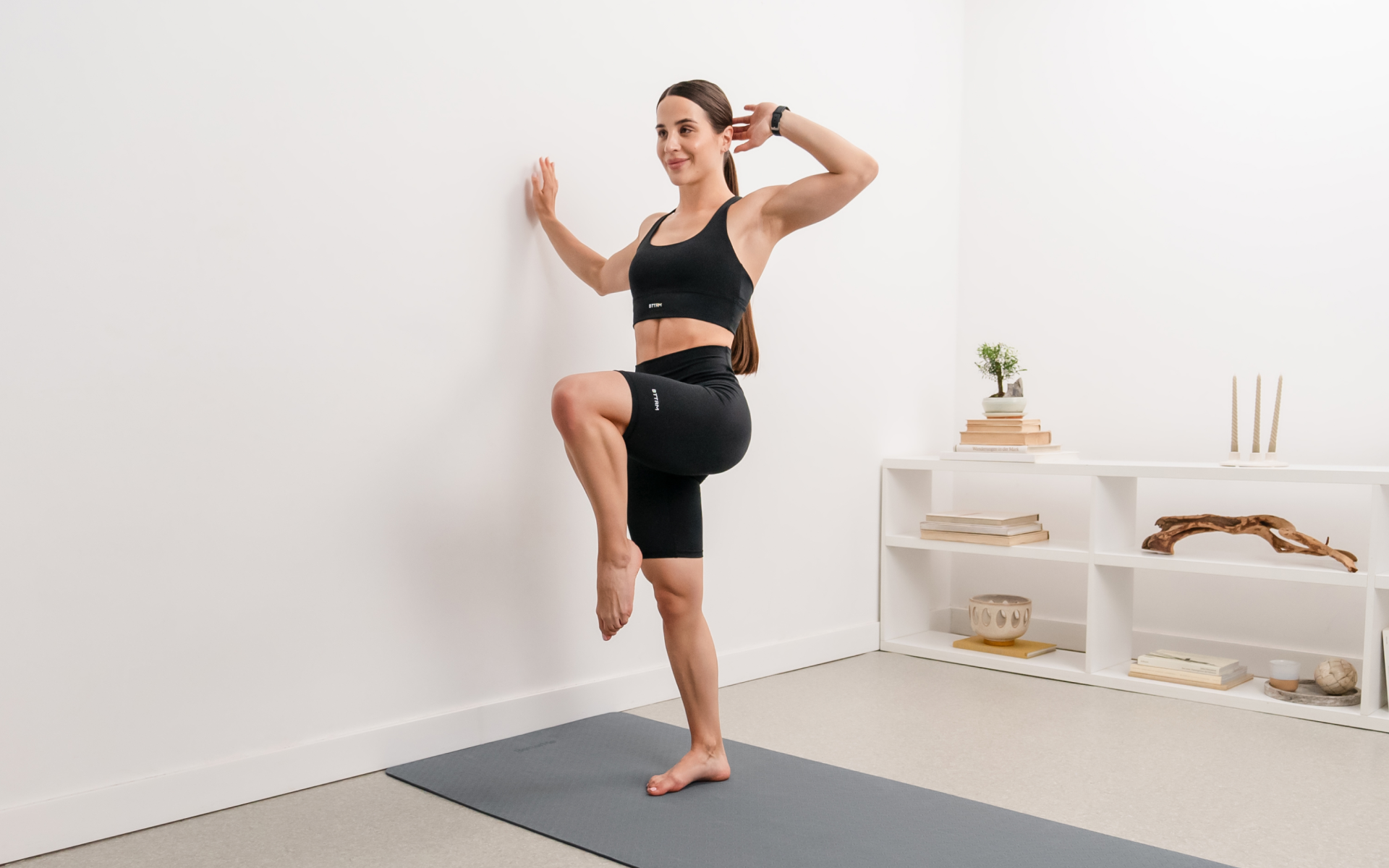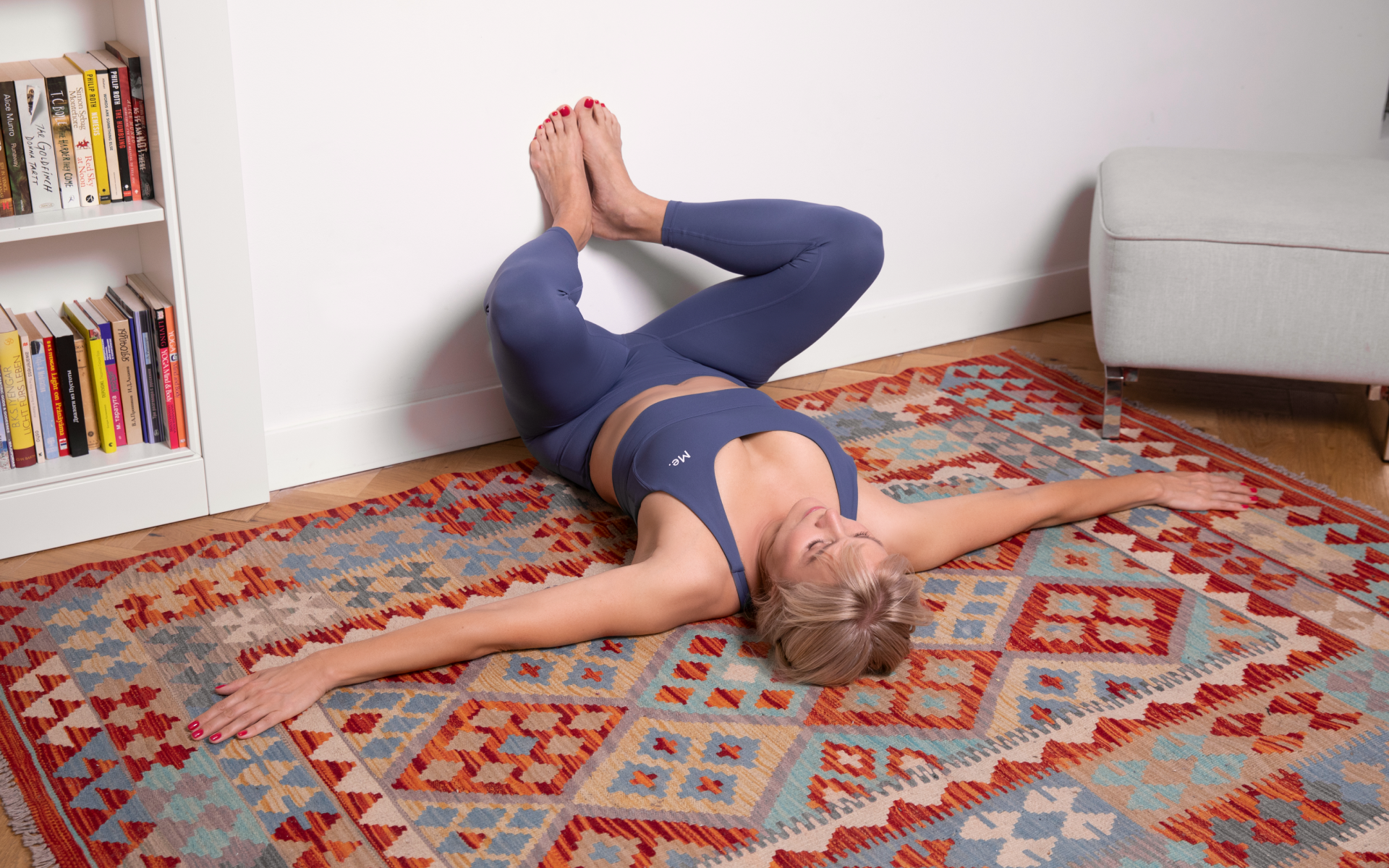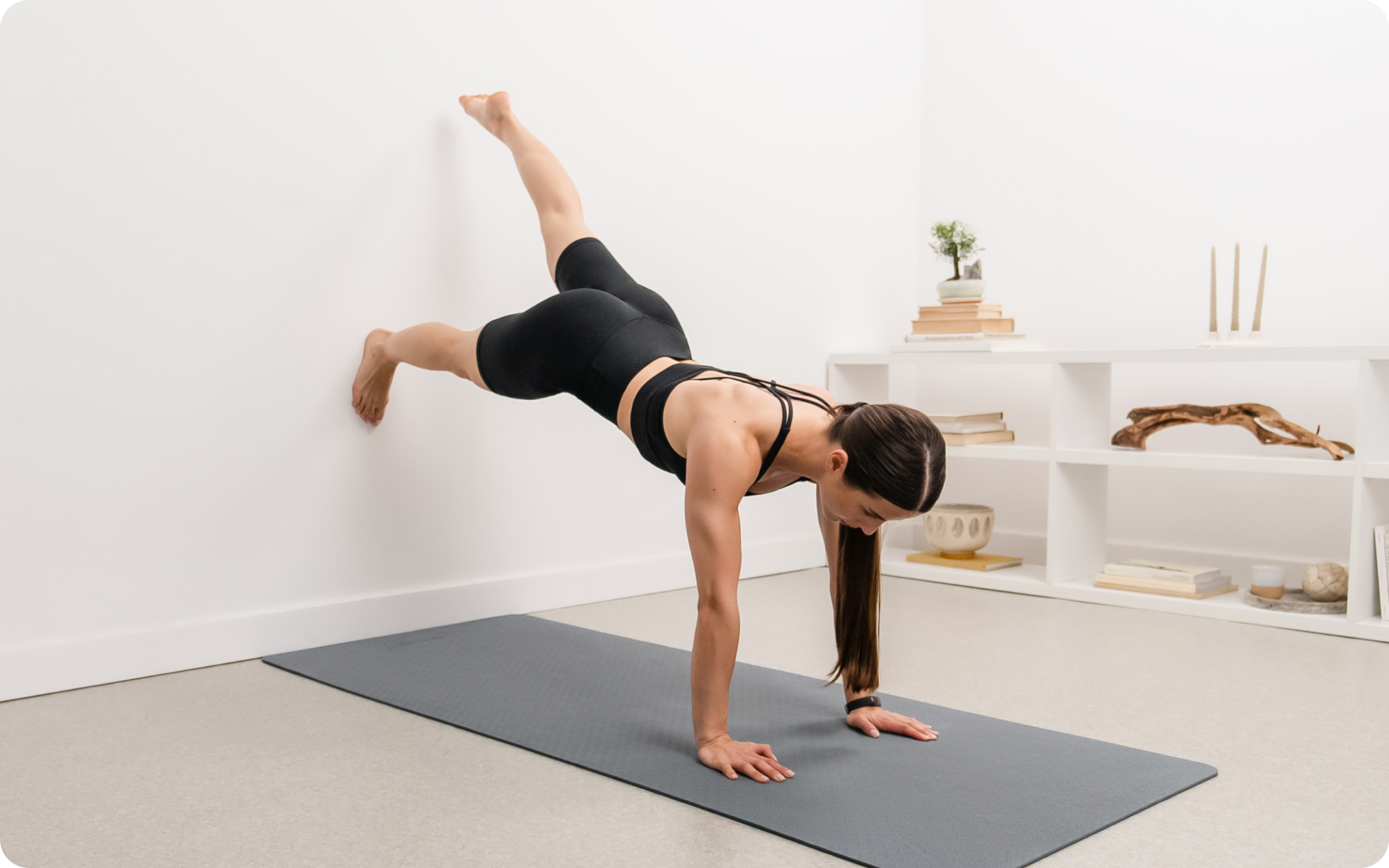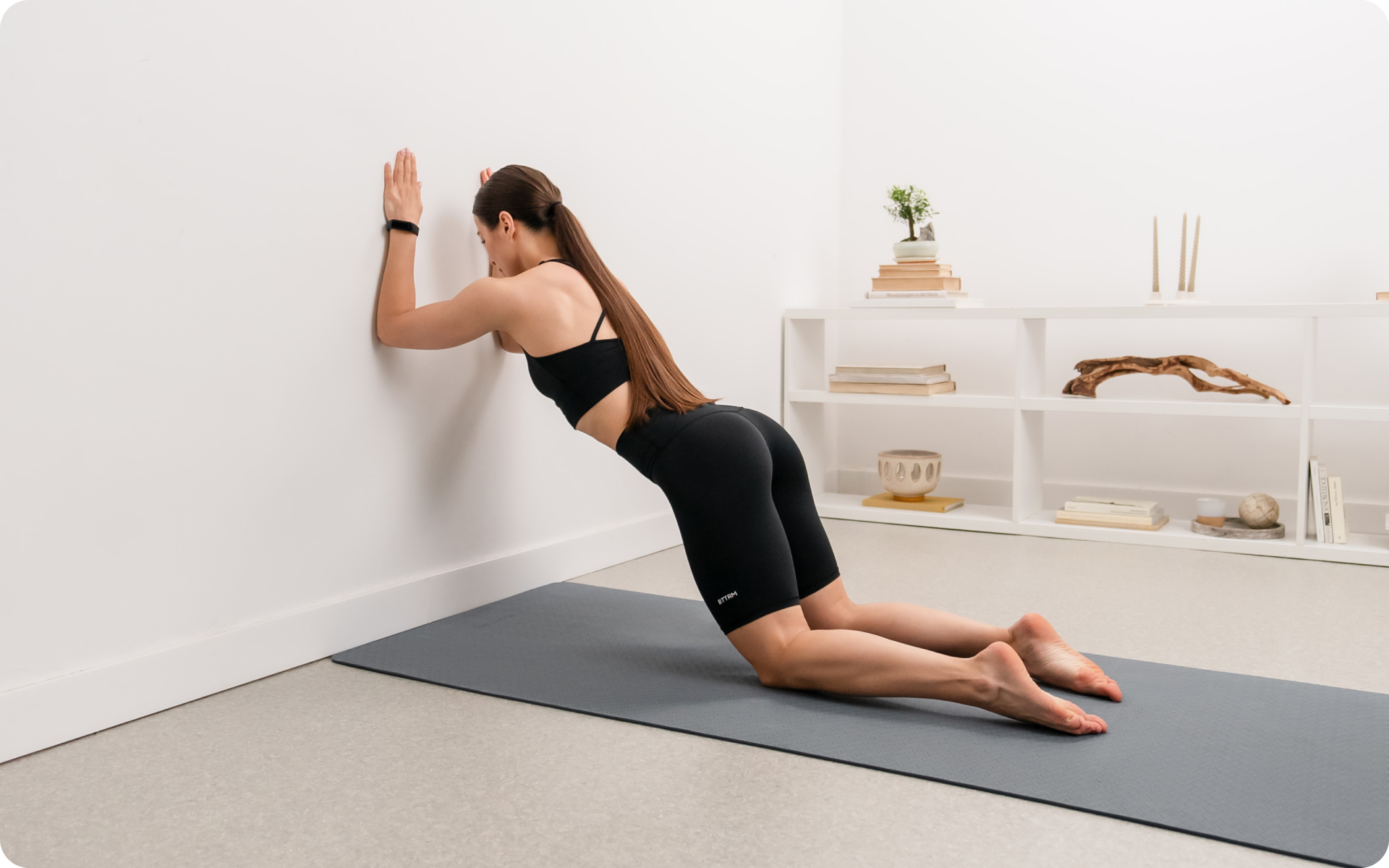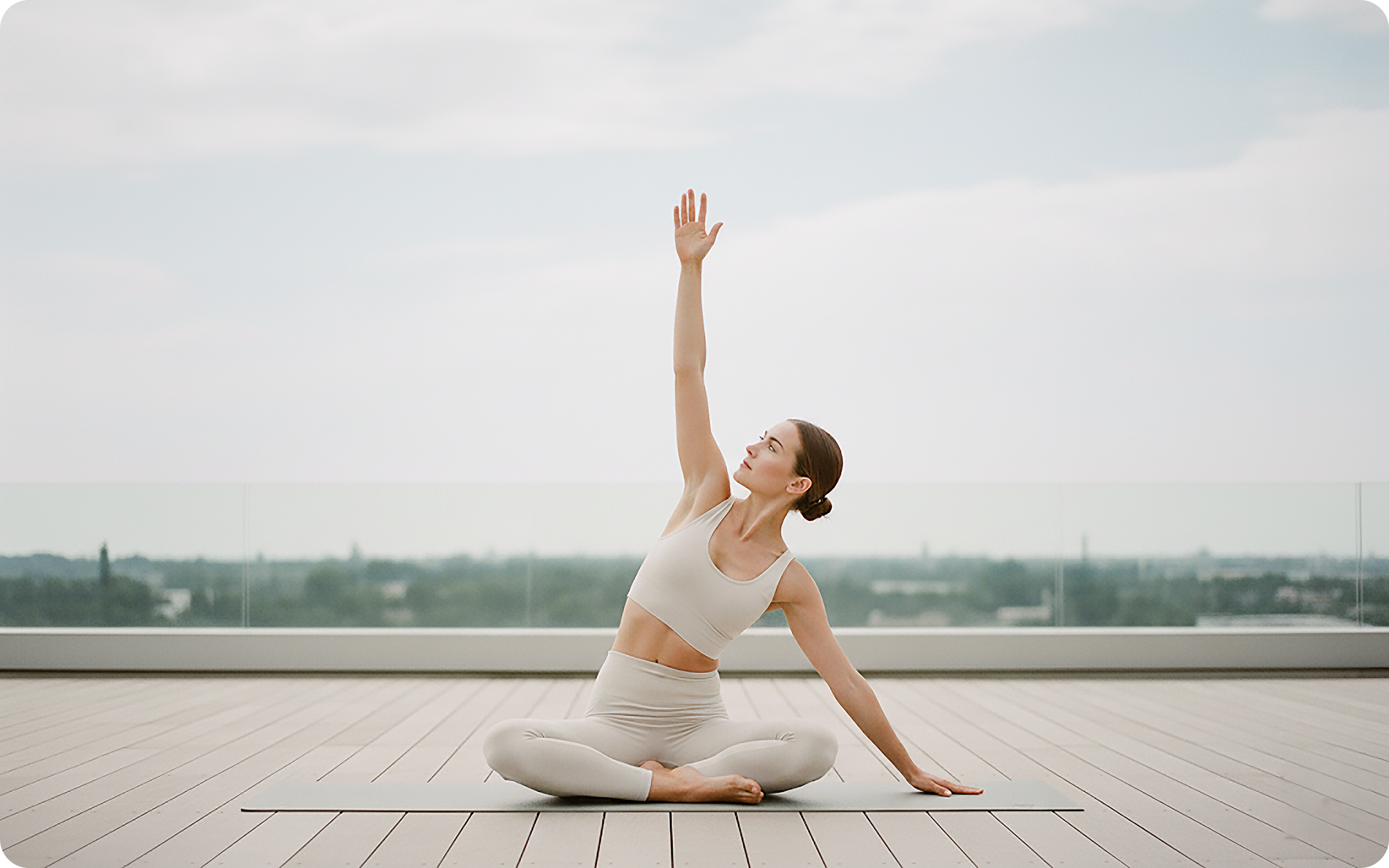The double leg stretch is a foundational Pilates exercise that can help improve core strength, flexibility, and coordination. It’s one of the most effective movements for building core endurance while promoting mind-body connection. Whether you’re a beginner exploring wall Pilates or an advanced practitioner who is looking to refine your technique, the double leg stretch is a powerful addition to any Pilates routine.
What Are Some Double Leg Stretch Pilates Exercises?
You will usually perform the double leg stretch in the supine position (lying on your back), but there are some variations you can try to modify the difficulty if necessary (1).
Traditional Double Leg Stretch
- Lie flat on your back on a mat.
- Bring your knees up to your chest, forming a tight ball position.
- Inhale as you lift your head, neck, and shoulders off the mat.
- Extend your arms toward your ears while extending your legs out at a 45-degree angle.
- Exhale as you circle your arms toward your sides, then loop them around to grab your shins and hug them in towards your chest.
Beginner Double Leg Stretch
The beginner double leg stretch is identical to the traditional version, but you extend your arms and legs straight up instead of at an angle. This requires less core strength and control than the traditional variation.
Wall Pilates Double Leg Stretch
The wall double leg stretch is almost the same as a traditional double leg stretch. However, with this alternative, you stretch your legs so they touch a wall, which allows you to tighten your legs and buttocks to help tone those muscles.
Double Leg Stretch with Resistance Band
Adding a resistance band around your feet while you perform the traditional double leg stretch can help add extra core and hip activation.
Reasons why BetterMe is a safe bet: a wide range of calorie-blasting workouts, finger-licking recipes, 24/7 support, challenges that’ll keep you on your best game, and that just scratches the surface! Start using our app and watch the magic happen.
How Do You Stretch Two Legs?
To effectively stretch both legs, focus on controlled movements that target the leg muscles, such as the hamstrings and quads. It’s also important to focus on your breathing to ensure the muscles get enough oxygen to function effectively (2).
Example Leg Stretches
Seated Forward Bend
- Sit with your legs extended, spine straight, and toes pointing up.
- Inhale, lengthen your spine and engage your core.
- Exhale and hinge at the hips as you reach for your ankles or feet.
- Hold the position and breathe deeply for 20-30 seconds.
Standing Double Leg Stretch
- Stand with your feet together, bending at the hips into a forward fold.
- Reach for your toes or your shins, keeping your legs straight or slightly bent.
- Hold the position and breathe deeply for 20-30 seconds.
Read more: Can You Lose Weight With Wall Pilates?
What Is the Double Leg Stretch in Pilates?
The double leg stretch in Pilates is a classic core-strengthening move that involves extending both arms and legs outward while keeping your abdominal muscles engaged (3).
Pilates Double Leg Stretch: Muscles Worked
Primary Muscles
- Rectus Abdominis – this is responsible for the six-pack and spinal flexion.
- Transverse Abdominis – the deep core muscle that stabilizes the spine and pelvis.
- Obliques – for rotation and lateral stability.
Secondary Muscles
- Hip Flexors
- Quadriceps
- Shoulders
Stabilizers
- Lower back
- Glutes and hamstrings
What Is the Purpose of the Double Leg Stretch in Pilates?
The purpose of the double leg stretch is to strengthen your abs for enhanced core strength. It encourages proper spine alignment and stretches the hip flexors to improve mobility. It also trains the body to focus on controlled movements over time, which can reduce fatigue (4).
What Are the Benefits of the Double Leg Stretch in Pilates?
Performing this movement can improve postural control and core stability, both of which may play a role in reducing back pain for some individuals. It will also make it easier for you to carry groceries and stand for long periods and give you better coordination when running, riding a bike, and engaging in sport-related activities (5).
How to Do a Double Leg Stretch Correctly
- Engage your core and keep your lower back pressed into the mat to avoid strain.
- Use controlled movements to extend your arms and legs simultaneously without arching your back.
- Focus on your breathing. Inhale as you extend and exhale as you return.
- Keep your neck relaxed and avoid straining your shoulders.
Whether you’re a workout beast or just a beginner making your first foray into the world of fitness and dieting – BetterMe has a lot to offer to both newbies and experts! Install the app and experience the versatility first-hand!
What Is a Modification for the Double Leg Stretch?
- Keep your legs against a wall for support while focusing on controlled arm movements.
- If you struggle to extend your legs fully, extend them until your knees are at a 45-degree angle.
- If neck strain is an issue, keep your head down and focus on your legs.
- Wrap a band around your feet for guided movement.
Read more: This Dynamic Pilates Leg Workout Will Strengthen Your Lower Body
Post Workout Stretches
Post-workout stretching helps with muscle recovery, flexibility, and relaxation (6).
Upper-Body Stretches
- Chest Opener
Clasp your hands behind your back, lift your arms slightly, and open your chest.
- Shoulder Stretch
Pull one arm across your chest and hold for 15-30 seconds per side.
- Triceps Stretch
Reach one arm overhead, bend your elbow, and pull gently.
Lower-Body Stretches
- Standing Quad Stretch
Pull one foot toward your glutes to stretch your quads.
- Hip Flexor Stretch
From a lunge position, push your hips forward to stretch the hip flexors.
A double leg extension is a movement where both legs extend outward from the bod in Pilates or leg strength exercises. The double leg stretch is a controlled version that engages the core and hip flexors (7). Many people consider classical Pilates to be the most difficult due to its strict technique and high-intensity exercises. Reformer Pilates can also be challenging, particularly with advanced resistance-based movements (8). Pilates may lead to improved muscle definition in the legs, arms, trunk, and core when proper training principles are applied. For example, performing exercises such as the double leg stretch helps sculpt leaner, more defined legs over time (9). Any form of exercise, including Pilates, can contribute to fat loss by increasing caloric expenditure to help achieve the necessary caloric deficit for weight loss. That being said, proper nutrition is essential for long-term results. It’s important to note that spot-reduction of fat isn’t supported by scientific research. In other words, there’s not sufficient evidence that shows you can target the excess adipose tissue in an area of your body by performing certain exercises or movements that engage the muscles that lie beneath it. Fat reduction occurs when you consistently achieve a caloric deficit (expending more calories than you consume). Body fat percentage will decrease in a relatively even distribution throughout the body, although the exact distribution of fat loss is dependent on variables such as your body type and genetics.Frequently Asked Questions
What is a double leg extension?
What is the hardest type of Pilates?
Can Pilates change your leg shape?
Does Pilates slim your thighs?
The Bottom Lines
The double leg stretch is more than just a core-strengthening exercise – it’s a full-body movement that enhances flexibility, coordination, and control. By consistently practicing it, you can improve your posture, reduce back pain, and strengthen the core muscles that are essential for everyday activities.
DISCLAIMER:
This article is intended for general informational purposes only and does not serve to address individual circumstances. It is not a substitute for professional advice or help and should not be relied on for making any kind of decision-making. Any action taken as a direct or indirect result of the information in this article is entirely at your own risk and is your sole responsibility.
BetterMe, its content staff, and its medical advisors accept no responsibility for inaccuracies, errors, misstatements, inconsistencies, or omissions and specifically disclaim any liability, loss or risk, personal, professional or otherwise, which may be incurred as a consequence, directly or indirectly, of the use and/or application of any content.
You should always seek the advice of your physician or other qualified health provider with any questions you may have regarding a medical condition or your specific situation. Never disregard professional medical advice or delay seeking it because of BetterMe content. If you suspect or think you may have a medical emergency, call your doctor.
SOURCES:
- Pilates Exercise Double Leg Stretch Explained | Learn Pilates Online (2025, pilatesclub.de)
- (PDF) A review of the acute effects of static and dynamic stretching on performance (2011, researchgate.net)
- How to do a Double Leg Stretch in Pilates? | – Power Pilates (2024, powerpilates.com)
- How to Engage Your Core (the Right Way) (2024, verywellfit.com)
- Effect of an exercise program for posture correction on musculoskeletal pain – PMC (2015, pmc.ncbi.nlm.nih.gov)
- How to stretch after exercising – NHS (2022, nhs.uk)
- Leg Extensions: Benefits, Muscles Worked, and More – Inspire US (2023, inspireusafoundation.org)
- Everything You Need to Know about Reformer Pilates | Balanced Body (2024, pilates.com)
- Effects of Pilates on muscle strength, postural balance and quality of life of older adults: a randomized, controlled, clinical trial – PMC (2015, pmc.ncbi.nlm.nih.gov)
